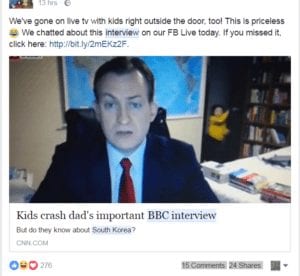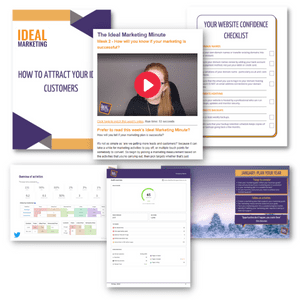The big story this weekend was the much-shared clip of the South Korea expert Robert Kelly being interviewed on the BBC. All is going well until his two young children rush into his home office during a live BBC news interview. He bravely soldiers on, calmly answering the questions and apologising until the children are eventually removed. However the story begs the question, just how do you prepare for an interview with the media? 
In truth, thanks to his ability to keep his cool under pressure, I don’t think that this incident has done Robert Kelly any harm. Indeed it has made him an instant celebrity, although perhaps it’s a type of fame which he’d rather not be known for. I’m sure he’d much rather be recognised as ‘the guy who is an expert on South Korean security’ than ‘the guy whose children interrupted him when he was live on TV’.
You may find yourself being interviewed in relation to a press release or an article pitch you have sent to the media. Or it might be because your company has a connection to a news story. Or perhaps you are regarded as an expert in relation to something that is currently making headlines? The truth is, appearing on live TV or radio always has its dangers and although you can’t predict what might happen around you at any given moment, you can certainly take precautions to make sure your big moment isn’t hijacked by something or someone nearby.
- Be available. Woody Allen said that 90% of being famous is showing up. I always make sure that when we send out a press release on behalf of a client I include four phone numbers at the bottom. These are usually daytime office numbers for both the client and the Ideal Marketing Company and also a mobile number for each of us. This doesn’t get printed or read out on air if it appears after ‘ends’ on the press release but it does get used if the producer needs a guest. I was called up at 10pm one evening to be a phone guest on Danny Baker’s Breakfast show on BBC Radio London. I assume somebody else had backed out. But that was OK as it was being listened to by around 100,000 people. Always be available so that if they want you, you can help them. If my number hadn’t been there or I hadn’t picked up, they would have moved on to the next person on the list.
- Be prepared. I was once asked to appear on BBC Radio 4’s ‘You and Yours’ alongside two MPs who were arguing against me as spokesperson for a client. It was a tough experience and as I was representing a brand new client, I was so glad that I had done my homework. One of the MPs was on a public health committee and was outraged by my client’s suggestions. Thankfully I had printed out a list of facts and figures that I was able to use to counter his argument with. He didn’t have many facts to come back with, so I was able to come across with at least some credibility – I hope. There is nothing wrong with taking a list of facts or key points that you want to get across (within reason) when going into an interview situation. This is particularly useful for a radio or newspaper interview as nobody can see your notes.
- Be concise. The most common complaint when a TV news piece goes on air is simply ‘is that it?’ The reason for this cry of despair is that after hours of filming, several interviews and various establishing shots, what actually makes it to TV is perhaps two minutes long at most. Not only that, sometimes the client interview has been cut out altogether. The most common reason for this? The interview answer was too long. So I’d say that it is better to give a succinct one-sentence answer to optimise the chances of your soundbite being used, rather than a detailed four-minute long answer, which runs the risk of being cut because there isn’t a clean edit point.
- Be safe. Whenever I do a live (or to a lesser extent pre-recorded) interview, I always let anybody who is around me (staff in the office, my family) know what is happening. I’ve even gone as far as unplugging the landline phone, front doorbell and turning down any volume control on my PC. Finally, I put a large handwritten sign on the door announcing ‘live radio interview, do not knock, do not enter’ onto my locked office door.
- Be familiar. Who is your interview with? If it’s a local BBC reporter, have a look on their profile page. Listen to one of their previous shows on the ‘listen again’ feature. What sort of person are they? You might even be able to find out about their hobbies, interests and previous guests. If it’s a newspaper reporter, see what sort of subjects they tend to write about. At the very least, you should find out which geographic area they cover and what their specialist subjects are. Then if you can make a reference to the subject, or local town or city then by all means do. Also, if you are speaking to a specialist technical journal with a niche audience, you can go into a lot more detail than you would with a local radio station.
- Be certain. Finally, make sure you ask in advance if the interview will be going out live on air. Always try to answer questions correctly the first time but if you make a complete mess of an answer and it isn’t live then you can just stop and say, ‘Sorry I don’t think that was clear. Let me try again’, then go back to answer the question more succintly. You can do something similar if a train goes past, a truck loudly honks outside your office or a child manages to batter down your door. If it’s live all you can do is apologise, keep on going and hope somebody will arrive to scoop up the child. On the radio, you can usually get away with it. With TV, it’s a little more problematic as South Korean expert Robert Kelly can tell you…
Would you like to get more exposure on TV, radio or in the press for your organisation? The Ideal Marketing Company can write press releases or article pitches which will help raise the profile of your organisation in the media. Contact us for help to get your message across without any interruptions.







